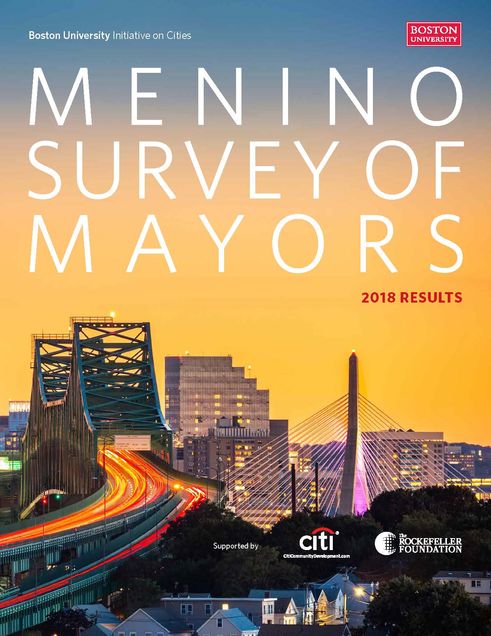Release of the 2018 Menino Survey of Mayors
On January 22, 2019, the Boston University Initiative on Cities released its fifth annual Menino Survey of Mayors, the only scientifically valid and representative survey of American mayors. The 2018 Menino Survey was built on interviews with 110 mayors from 37 states, and was supported by Citi Community Development and The Rockefeller Foundation.
 Initiated in June 2014 and named in honor of the Initiative’s late Co-Founder Mayor Tom Menino, the project was designed to gain insight into the priorities and challenges facing America’s mayors. A team of Boston University researchers—including Political Science faculty Katherine Levine Einstein, David Glick, and Maxwell Palmer, and Initiative on Cities staff Stacy Fox and Katharine Lusk—interviewed mayors one-on-one throughout the summer of 2018. The 2018 Survey reveals mayoral views on economic development—including corporate recruitment, financial incentives, the sharing economy, and social mobility—as well as public health, housing, and intergovernmental relations.
Initiated in June 2014 and named in honor of the Initiative’s late Co-Founder Mayor Tom Menino, the project was designed to gain insight into the priorities and challenges facing America’s mayors. A team of Boston University researchers—including Political Science faculty Katherine Levine Einstein, David Glick, and Maxwell Palmer, and Initiative on Cities staff Stacy Fox and Katharine Lusk—interviewed mayors one-on-one throughout the summer of 2018. The 2018 Survey reveals mayoral views on economic development—including corporate recruitment, financial incentives, the sharing economy, and social mobility—as well as public health, housing, and intergovernmental relations.
Findings show that the affordable housing crisis remains top of mind for America’s municipal leaders, with housing costs being the only issue both Democratic and Republican municipal leaders agree serve as a significant barrier to the social mobility of their city’s residents. Likewise, a majority of mayors across the country view affordable housing as an integral part of their city’s infrastructure, and nearly all believe decisions regarding housing should be made at the municipal level, not state or federal.
Mayors are more divided, however, on the role living wage jobs play in social mobility; four in ten Democratic mayors cite the lack of living-wage jobs as the single greatest barrier to social mobility, compared to just one in ten Republican mayors. In fact, more Republicans—nearly two in ten—believe there are no barriers to social mobility in their cities. Mayors are also divided on living wage ordinances at the local level, with six in ten Democratic mayors supporting these policies—and the potential trade-offs. No Republican mayors expressed support.
The IOC shared parts of the research at the National Press Club in Washington, DC, with city officials, media, and supporters from Citi Community Development and The Rockefeller Foundation.